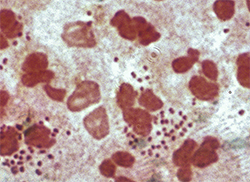Gonorrhoea vaccine might halve infections and help combat drug resistance
1 July 2022. Related: Coinfections and complications.
Kirk Taylor, HIV i-Base

Microscope preparation of Gram-stained pus from a case of gonorrhoea. G Beards/Wiki.
New research indicates that a meningitis vaccine might reduce gonorrhoea transmission by 46%. [1]
This is important given how common gonorrhoea remains in the UK and the concerns over antibiotic-resistant strains which call for new treatment, even currently treated with ceftriaxone.
Gonorrhoea and meningitis are genetically similar and both express outer membrane vesicles (OMV). The two major meningitis vaccines: MenACWY and 4CMenB target surface sugars and OMV, respectively. MenACWY is widely used with 2CMenB used for meningitis B outbreaks.
Observational studies noted lower gonorrhoea case rates in young adults that had received 4CMenB vaccination. [2]
Researchers conducted a retrospective cohort study of young adults registered at Kaiser Permanente Southern California (KPSC) to evaluate links between gonorrhoea transmission and meningitis vaccines. Participants that had received at least one 4CMenB dose were matched 1:4 with people that received MenACWY only.
The 4CMenB group (n= 6,641) were female (55.1%), White (37.4%), Hispanic (32.2%), Black (9%), Asian (15.3%) and median age at first vaccination was 18 (IQR: 17 to 20). The MenACWY only group (n= 26,471) were female (54.9%), White (38%), Hispanic (47.7%), Black (8.5%), Asian (10.8%) and median age at first vaccination was 18 (IQR: 17 to 19).
Gonorrhoea rates per 1,000 person years were 2.0 (95% CI: 1.3 to 2.8) vs 5.2 (95% CI: 4.6 to 5.8) for the 4CMenB and MenACWY only groups, respectively. 4CMenB was associated with 46% lower chance of gonorrhoea transmission.
Gonorrhoea rates were higher amongst HIV positive people and those using PrEP. Adjusted hazard ratios for 4CMenB vs MenACWY only groups were 6.99 (95% CI: 3.79 to 12.89) and 9.10 (95% CI: 5.07 to 16.33) for HIV positive people and PrEP users, respectively.
These findings suggest that re-purposing meningitis vaccines could be a valuable tool in the fight against antibiotic-resistant gonorrhoea. It will therefore be important to follow the outcomes of an interventional trial in this area. [3]
comment
This is an interesting study that provides hope for a gonorrhoea vaccination by repurposing an existing and well-tolerated meningitis vaccine.
Further studies are required to evaluate efficacy in HIV positive people due to low sample sizes; n= 6 and 294 for 4CMenB and MenACWY only, respectively.
References
- Bruxvoort KJ et al. prevention of Neisseria gonorrhoeae with meningococcal B vaccine: a matched cohort study in Southern California. Clinical Infectious Diseases. DOI: 10.1093/cid/ciac436 (01 Jun 2022).
https://academic.oup.com/cid/advance-article-abstract/doi/10.1093/cid/ciac436/6596517?redirectedFrom=fulltext - Paynter J et al. Effectiveness of a group B outer membrane vesicle meningococcal vaccine in preventing hospitalisation from gonorrhoeae in New Zealand: A retrospective cohort study. Vaccines. DOI: 10.3390/vaccines7010005 (05 Jan 2019).
https://www.ncbi.nlm.nih.gov/pmc/articles/PMC6466174/#!po=65.3846 - Safety and efficacy study of meningococcal group B vaccine rMenB+OMV (Bexsero) to prevent gonococcal infection. https://clinicaltrials.gov/ct2/show/NCT04350138
This report was first published on 26 june 2022.

